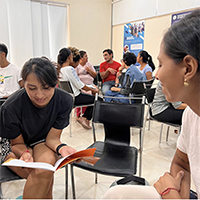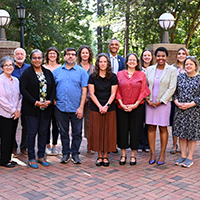by Matthew Smith
The Galapagos Islands conjure up images of evolution and extraordinary wildlife — ranging from giant tortoises to specialized finches and swimming iguanas.
But the regions’ inhabitants are often overlooked for their fantastical animals and vegetation.
That is where a team of interdisciplinary researchers from the University of North Carolina at Chapel Hill are filling the gap, collaborating across schools to put the people of the island first.
Natalia Villegas Rodriguez, an associate professor in the School of Nursing, and School of Social Work faculty members Cynthia Fraga Rizo, Mimi Chapman and Rainier Masa, teamed up to better understand how youth in the Galapagos can enhance their health and promote healthier lifestyles. The work focuses on promoting healthy development among youth through an asset- or strengths-based framework.
By working directly with the community, the team hopes to develop training programs to enhance the skills already possessed by the island’s youth. Those programs may potentially prevent future youth pregnancies and violent occurrences through educational interventions.
“… It’s not just collecting this information and publishing it,” Villegas Rodriguez said. “Our final objective is that we collect this information and, together — we and the community — design interventions and trainings that can empower youth and prevent these issues.”
Community need
Made possible by a 2020 seed grant from the School of Social Work and support from the UNC Center for Galapagos Studies, the study took shape in two parts.
First, the School of Social Work’s Fraga and Chapman traveled to the island in late May to meet with community partners to lead a Photovoice project. Photovoice uses community-based participation that features participants capturing aspects of their environment and experiences through photography.
The second half of the project — the primary focus of the team’s latest trip in August — narrowed its scope to youth pregnancy and violence due to community need.
Ecuador, home of the Galapagos Islands, has one of the highest rates of youth pregnancy in the Americas — nearly 26 percentage points higher than the global average of 43.8%. Social determinants of health, including education, socioeconomic status and violence, play a key factor in that higher rate.
The UNC team partnered with local research assistants to take a community-engaged approach to the study, turning the project into a true collaboration between the community and the study’s investigators.
“Even though our team has experience in terms of having knowledge of the culture and the language, we felt that incorporating the research assistants gave an additional piece that included the people of the community, while also improving the health of all Galapaganians,” Villegas Rodriguezsaid.
People first
Along with placing community members at the forefront of their study, the UNC research team used a positive youth development (PYD) approach to collect data.
The approach moves away from focusing on the risks and deficiencies of a population, instead recognizing the assets a community has to offer. Instead of focusing on “what’s wrong” in a community, the approach engages youth in the Galapagos — along with their parents and peers — to foster positive outcomes.
Use of PYD research and practice is growing in the United States, but its use in Latin America and surrounding island communities has been limited.
“Even before we come here and start working with them, they have their lived experiences,” Masa said. “They have their own assets; they have their own agency. They’re doing things to overcome their daily challenges.
“We want to recognize that. We want to focus on ‘Okay, what are these strengths and what are these assets that can help young people navigate their daily experiences?’ Particularly when it comes to preventing undesirable social and health outcomes.”
Taking a PYD approach allowed researchers to examine how young Ecuadorians currently saw themselves and imagined their futures, empowering them to prevent some of those health issues identified by the research team.
Findings and outcomes
During their two weeks in the Galapagos in August, the research team interviewed 20 youth from the island. While the researchers are still analyzing the data, preliminary findings showed that island youth are experiencing high rates of pregnancy and domestic violence.
Although some have not experienced domestic violence in their relationships, they did share family histories of intimate partner violence.
Some study participants said they felt like they needed more resources to ask for help and are not confident asking for treatment. Many also face mental health issues from a lack of support, which can lead to depression.
Researchers said they hope to explore more of what the youth mentioned in their interviews — including intimate partner violence and its role in their relationships, their families and with their peers. Of special concern was the role substance abuse plays in negative health outcomes and domestic violence.
“Findings can be helpful in different ways,” Villegas Rodriguez said. “Even when Galapagos are far from the U.S., the Latino cultural values are similar and our preliminary findings indicate that youth confront similar issues to the issues that Latino youth face in the U.S., such as lack of knowledge about pregnancy and intimate partner violence prevention; limited interventions that provide education, lack of trust in health care providers and their parents … .”
“Findings and lessons learned here and in the Galapagos can provide valuable information to enhance prevention efforts in these areas in both regions,” she said.
Future studies
With this interdisciplinary trip complete, the UNC team hopes to return to the island to follow up with their current study and lead future research in continued partnership with the community.
Masa, the research director of the Global Social Development Innovations research center, believes there are increasing opportunities for UNC to partner with the Universidad San Francisco de Quito — the sole university campus on the island.
“There is interest in expanding the work being done here, particularly focusing on people living on the island,” Masa said. “I think that’s where the collaboration between the School of Social Work and the School of Nursing started. There was an opportunity to work together to address the needs and issues affecting people living in the Galapagos.”
For more on the UNC Center for Galapagos Studies and its involvement in Galapagos-related research, teaching, and outreach activities, visit the center online.
Related stories

School of Social Work, USFQ launch social work certificate program
UNC-Chapel Hill School of Social Work and the Universidad San Francisco de Quito (USFQ) have launched an exciting new collaboration.

Villegas Rodriguez selected as Thorp Faculty Engaged Scholar
Associate Professor Natalia Villegas Rodriguez was recently named a member of the ninth class of the Thorp Faculty Engaged Scholars.


